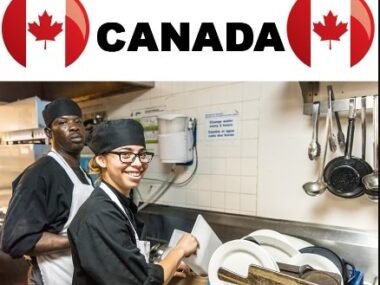Meat processing jobs in Canada provide a stable and rewarding career, with many employers offering visa sponsorship to foreign workers. This means that if you’re seeking an opportunity to work in Canada in the meat processing field, the government’s immigration policies and industry-specific hiring trends can help make your dream a reality.
The meat processing industry offers various job opportunities, especially for foreign workers, as Canada faces a shortage of skilled labor in many of its essential industries
Understanding the Meat Processing Jobs in Canada
The meat processing industry in Canada is one of the country’s most critical sectors. It encompasses the production, processing, and packaging of meats such as beef, pork, chicken, and lamb, among others. Canada is one of the largest exporters of meat globally, with a significant demand for skilled workers across various roles in the industry.
In recent years, the need for foreign workers has increased due to labor shortages in rural areas where meat processing plants are located. As a result, employers in the meat processing sector are actively recruiting workers from other countries and are often willing to sponsor visas to ensure they meet their staffing needs.
Why Consider Meat Processing Jobs in Canada?
1. High Demand for Workers: The meat processing industry in Canada faces consistent demand, and companies in this field are always looking for qualified and skilled workers. The industry has a variety of roles, from general labor to skilled trades, offering numerous opportunities for foreign nationals.
2. Competitive Salaries and Benefits: Workers in meat processing plants are compensated fairly, with salaries often ranging from $30,000 to $50,000 annually, depending on experience and the role. Additionally, many employers offer benefits such as health insurance, paid vacation, and retirement plans.
3. Visa Sponsorship Opportunities: Many employers in Canada’s meat processing industry offer visa sponsorships to foreign workers. This means that you can apply for a work visa, and your employer will assist with the process, giving you the legal right to work in Canada for a specified period.
4. Job Security and Growth: The meat processing industry is essential to Canada’s economy, which means job security is relatively high for workers in this field. Furthermore, there are opportunities for advancement, with many entry-level employees advancing to supervisory and managerial positions after gaining experience.
Types of Meat Processing Jobs Available in Canada
The meat processing industry in Canada offers a wide variety of job opportunities, ranging from entry-level positions to skilled roles. Here are some of the most common jobs available:
1. Butchers and Meat Cutters
Butchers and meat cutters are responsible for slaughtering animals and cutting the meat into various sections for sale. These roles require precision and experience in handling meat safely. Butchers may also be responsible for preparing specific meat products like sausages or cured meats.
Key Responsibilities:
- Slaughtering livestock
- Cutting and portioning meat
- Operating cutting tools and machinery
- Ensuring hygiene and food safety standards
2. Meat Packers
Meat packers work in packaging departments, ensuring that meat products are packaged and sealed for distribution. They may also be involved in labeling products and managing inventory.
Key Responsibilities:
- Packaging meat products
- Operating packaging machines
- Ensuring food safety regulations are followed
- Labeling products correctly
3. Quality Control Inspectors
Quality control inspectors ensure that the meat products meet Canada’s food safety and quality standards. They inspect the products for signs of contamination, spoilage, or other quality issues.
Key Responsibilities:
- Inspecting meat products for defects or contamination
- Ensuring compliance with Canadian food safety regulations
- Keeping records of inspections
- Reporting any issues to supervisors
4. Processing Plant Workers
Processing plant workers perform general labor duties, including assisting butchers and meat packers. They may also handle raw meat, clean machinery, and maintain safety standards within the plant.
Key Responsibilities:
- Assisting with slaughtering and cutting meat
- Cleaning and sanitizing equipment and workspaces
- Ensuring that workers follow food safety protocols
5. Machine Operators
Machine operators are responsible for operating and maintaining the machinery used in meat processing plants. This includes everything from slaughtering equipment to packaging machines.
Key Responsibilities:
- Operating machinery used in meat processing
- Conducting maintenance on equipment
- Troubleshooting any malfunctions with machines
How to Apply for Meat Processing Jobs in Canada
If you’re interested in securing a meat processing job in Canada, here’s what you need to do:
1. Prepare Your Resume and Cover Letter
To start applying for jobs, make sure your resume is tailored to the meat processing industry. Highlight any relevant experience, especially if you have worked in manufacturing, food processing, or agriculture. Don’t forget to include any certifications or qualifications related to food safety, hygiene, or machinery operation.
2. Search for Jobs
There are several websites where you can find meat processing jobs in Canada. Some popular job search platforms include:
- Indeed Canada: A great resource for finding meat processing positions.
- Job Bank: The Canadian government’s official job portal.
- Glassdoor: Another excellent platform to find job listings and company reviews.
- LinkedIn: Allows you to connect with recruiters and companies hiring for meat processing roles.
3. Apply Through Employer Websites
Many companies in the meat processing industry have their career pages where you can directly apply for open positions. Look for large companies such as Cargill, Maple Leaf Foods, and Tyson Foods, as they often have multiple job openings in Canada.
4. Obtain a Work Visa with Sponsorship
Once you receive a job offer, your employer will help you apply for a work visa. Canada has several work visa programs for foreign workers, such as the Temporary Foreign Worker Program (TFWP) and the International Mobility Program (IMP). If your employer is offering visa sponsorship, they will guide you through the process.
5. Follow Up and Prepare for the Interview
After applying, it’s essential to follow up with the employer to show your interest. If you’re selected for an interview, make sure to prepare by researching the company, understanding the role, and reviewing common interview questions. Employers often look for candidates who are adaptable, eager to learn, and able to work in fast-paced environments.
Benefits of Working in the Industries in Canada
1. Work-Life Balance: Many meat processing companies in Canada offer a good work-life balance, with stable hours and overtime pay.
2. Visa Sponsorship: Visa sponsorship for foreign workers is a common benefit in Canada’s meat processing sector, helping international applicants secure legal employment in Canada.
3. Community and Support: Canada’s immigrant-friendly policies make it easier for foreign workers to adjust to life in Canada. Once you arrive, you’ll find support from your employer, as well as community resources to help with the transition.
4. Pathway to Permanent Residency: If you work in Canada for a sufficient period, you may be eligible to apply for permanent residency through programs such as the Express Entry system or Provincial Nominee Program (PNP).
Conclusion
Meat processing jobs with visa sponsorship in Canada provide an excellent opportunity for foreign workers looking to start a new career in a thriving industry.
With a strong demand for workers, competitive salaries, and the chance to live and work in one of the world’s most desirable countries, Canada’s meat processing sector offers a pathway to long-term job security and career growth.
By following the steps outlined in this article, preparing your application, and applying through the right channels, you can take the first step toward a fulfilling career in Canada’s meat processing industry.






